They say that time flies as your get older. A day that used to take forever zips by in the blink of an eye. I couldn’t agree more. As I sit here now on a Friday morning (my only day off), I realize it’s already the end of Week 12 out of the 16/17 weeks we run classes. Midterms take up Week 8 and Finals are Week 17 or thereabouts. Overall, the semester has been rather uneventful, other than the fact the days just seem to run into each other. Mondays and Thursdays are my busy days so, basically, once I go to sleep on Sunday and Wednesday night, I pretty much consider my day over in that I really can’t make any other plans.

I’ve started Chinese lessons again and this semester is a little bit different. Typically we (my teacher and I, I don’t go to group classes) use textbooks geared for beginners but, like many of my students, I find them lacking in what I really want to cover: something I can use. Sure the textbooks are good to build the foundations of a/the language, but they are often out-dated and not really on topics I care to discuss. And so what was my solution?
Business Chinese.
Doing a bit of math, most of the Chinese textbooks cost about 28-35 RMB ($5-7). They would contain all sorts of stories and vocabulary for me to practice, including several exercises, and we’d probably supplement that with other material. We’d use that book for about 6-8 weeks before the classes would finish for the semester. Not a bad idea but these textbooks aren’t the most thrilling works of literature in the world. Anyway, my solution was to come up with something more “real world”. And so I chose to read the newspaper. Newspapers only cost about 4-5 RMB ($1), are more current, and, well, I won’t feel as bad about throwing them out afterwards. True, I might not have the same record of my progress in Chinese, but I’m sure I can find other ways to concretely track my progress.

Now where did I get this idea to read the newspaper?
Well, back one year ago or so there was this German professor (about the same age as me) who said that he was confused by how the students couldn’t know English. When he wanted to learned English he simply picked up the newspaper and started reading. I do remember looking at him as if he was on crack but, then again, German to English isn’t so bad. But English to Chinese? This seemed a bit more difficult.
And it was.
I picked out bits and parts and it looked good to the others around me and, probably most importantly, the above picture looked REALLY good when I posted it so all my students could see. What an inspiration I am! Calls of 加油! (Jia you! Come on! / Let’s go!) resounded all around and everyone was happy that I was having a go at learning this difficult language. Well, truth be told, looking at a Chinese newspaper when you don’t know Chinese looks, well, uh, like Chinese; like “pick up sticks” as one other new teacher put it. And like shit I’d use a paper dictionary to read a newspaper! Nope. I was using my electronic dictionary so I could draw the characters in one by one.
Total learning from my first attempt at reading a Chinese newspaper?
华中 - huazhong – central China
安全 - anquan – safety, security
That’s about all I can remember.
How was my speed? Slow. I think my finger nails grew faster.
Anyway, I’ll persist and maybe one day it might actually make sense.
And finally, my new alarm clock.
Twice a year the university runs military drills bright and early in the morning. My university apparently has one of the better military programs in the country. There are no guns involved or anything like that, just mostly marching and running around, raising the flag and… shouting.
The students need to be there by 0600 (6 am to use regular folks) and 604 is the roll call. Their name is called and they must shout “到” (Dao, “Here!”), if they don’t, then one of the numerous instructors must go investigate the situation. From there, they break off into smaller compartments, boys and girls separate, and they do a couple of laps around the track. This wouldn’t be so bad if they simply ran like so many other morning joggers, but no, they must make everyone aware of the fact that they are up and running and being healthy (in Beijing’s air) and disciplined while others are lazily sleeping in past 0610. How do they do it?
In order to keep everybody on the same foot the leader shouts out “YI er YI! YI er YI!” (One, two, one! One, two, one!) before screaming “YI ER SAN SI” (One, two, three, four) which the jogging militants must repeat in full force. The worst part about this little early morning singing recital is that they don’t just do it once, they actually have a pattern of chants:
1st: YI! ER! SAN! SI!
2nd: YI ER SANNNN SI!
3rd: YI ER! SAN SI!
4th: YI ER! … SAN SI!
And on it goes. They sing that about once per lap. It’s not so bad when the girls yell it as they often sound as if they are in the distance somewhere. But when the guys do it, even if they are across the field from my apartment the sound bounces off the walls and hits my apartment as if they are right outside it.
Last year I got mad at this intrusion of my sleeping time. So mad, in fact, I threw a can of water out the window at them (I didn’t even make it close to the track). But this year I’m a little more accepting. I wake up with my typical exclamatory statements when something wakes me earlier than I deem necessary, and then get on with my life. I have no problem with a country instilling discipling into its citizens nor with military drills in general, I think they are important. I just wish they wouldn’t do it at 6 am outside of my apartment. Maybe it’s time for me move apartments?